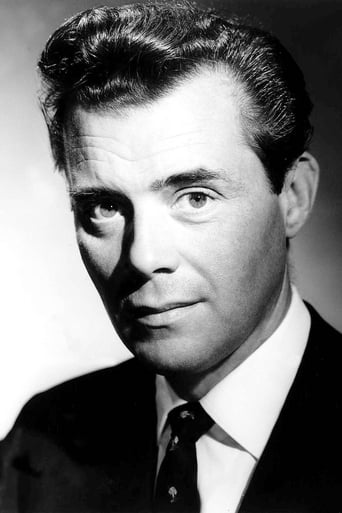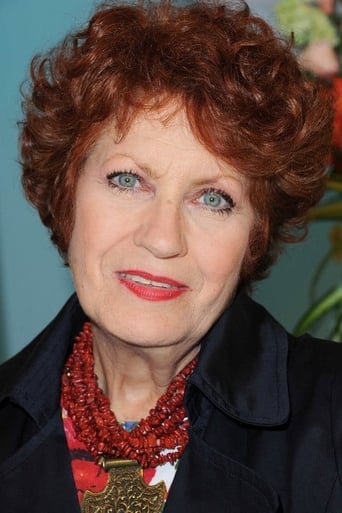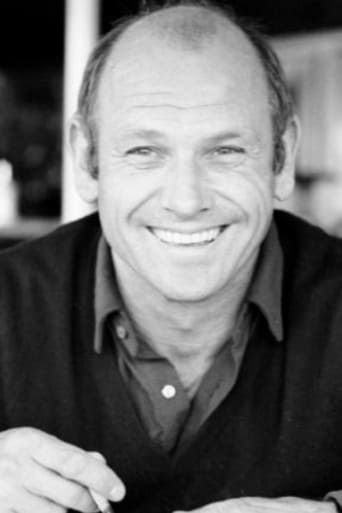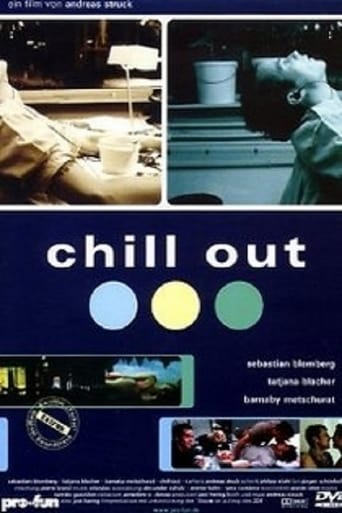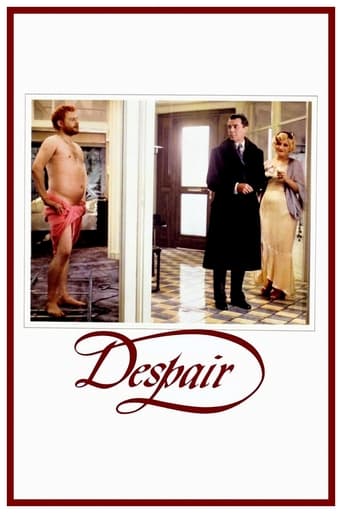
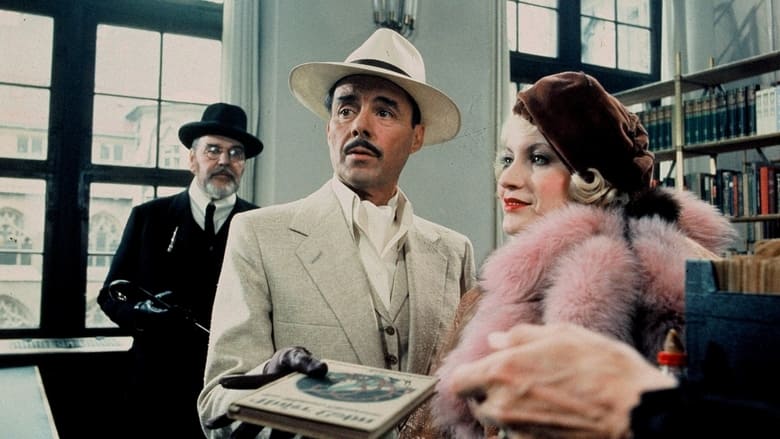
Despair (1978)
Berlin, 1930, during the rise of Nazism. Hermann Hermann, a Russian emigrant and chocolate manufacturer, married to the capricious Lydia, loses his temper more and more every day when dealing with his workers and other businessmen; until he meets Felix, a vagrant, who seems to be physically identical to him; a disconcerting fact that leads Hermann Hermann to plot a particular way out of a fake world he actually hates.
Watch Trailer
Cast


Similar titles
Reviews
A Masterpiece!
This is a tender, generous movie that likes its characters and presents them as real people, full of flaws and strengths.
Although I seem to have had higher expectations than I thought, the movie is super entertaining.
The story, direction, characters, and writing/dialogue is akin to taking a tranquilizer shot to the neck, but everything else was so well done.
Based on a novel by Vladimir Nabokov, Rainer Fassbinder's "Despair" revolves around Hermann Hermann, a Russian emigrant who owns a chocolate factory in 1930s Berlin.Dull and overly melodramatic, "Despair" finds Hermann maritally, culturally and politically disconnected from everyone and everything around him. Trapped in a cycle of work, sex, drugs and chocolate, which he pushes upon grotesque Germans who block out life with all manners of sweetness, Hermann hatches a plan for escape. How? He will find a body double and fake his own death! Death, he hopes, will offer him solace, will end his despair, will constitute an emancipatory journey toward the light! More specifically, death will allow Hermann to escape his bankrupt company, his ditsy wife, his Jewish identity, an increasingly racist Germany and various bourgeois absurdities. To Hermann, death is freedom! Unsurprisingly, the film is dedicated to three artists - Antonin Artaud, Vincent Van Gogh and Unica Zurn - all of whom committed suicide after severe bouts of depression. "If I commit suicide, it will not be to destroy myself," Artaud said before his death, "but to put myself back together again." Some biographers view "Despair" itself as being vaguely autobiographical, Fassinder, who died of a drug overdose, seeking similar escape.Regardless, "Despair" stars Dirk Bogarde as Hermann Hermann. Klaus Lowitsch plays his double, a man who likewise seeks escape, this time from a life of poverty. Lowitsch would play the lead role in Fassbinder's "World on a Wire", another film in which he plays a double and in which life is seen to be a charade. Both "Wire" and "Despair" also end with their leads locked in what their blissful but now insane minds wrongly believe to be "reality". In "Wire", Lowitsch dances in computer simulated rooms. In "Despair", Bogarde sleeps in a grimy apartment up in the Swiss mountains, believing himself to be a movie actor and life to be an elaborate movie production. Hermann's dislocation and disassociation may be complete, but despair never leaves him.6/10 - See 1962's "Lolita".
Wonderful pattern of REAL ART-film for me.I suppose Fassbinnder showed very precisely here, the difference between artistic reality and rough and dull one, maybe they can penetrate each other, but eventually that's impossible for the first to exist, when the second is becoming aggressive. As I read, Hermann of Nabokov in the novel "Despair" is a kind of artist. Fassbinnder based his film on this moment as I understood: he dedicated the film to Van Gogh and other artists.Marvelous world of Hermann's house with sweet and funny (like chocolate?!) Hermann's wife Lydia and her brother Ardalion (amazing red-haired and red-bearded Russian, in highest extent picturesque and grotesque but exquisite image of how-Europeans-imagine-Russians). This candy paradise is being eaten by insatiable and horror monster.But who is that monster or what is that monster, I think, here are many variations. Hermann's artistic and refined mind itself, which created all this splendor before, may be. Or banal savage real-life of barracks, from which Hermann wants to escape at the end of film.Many things in the film are flying above the ground. Like Nabokov's butterflies: main characters - Hermann and relatives, exquisite absurd humor, locations of house, restaurant, even Hermann choco factory in lilac color, holiday at the lake (Ardalion - mermaid man :))). Stepping on the ground are only awful bearded and haired Felix - double-ganger, as usual Nazi-men in the streets, detectives-noir.Dirk Bogarde, yet more slim and dry as never before, as a new-level reincarnation of his previous morbid and fatal characters in cinema, finally becomes quite abstract figure. And it's a brilliant zenith of his long and complex actor career as I think.Yet I'd add that Despair is a great example of how can make films about artists - sparkling but not heavy-weighted costume biopics.
What can I say -- watch the film. And don't read the other posters comments -- he didn't like the film, or even bother finishing it but felt compelled to make a list of pointless spoilers in his useless comments.This was Fassbinders shot at 'commercialism', which he failed at entirely (thankfully) but we are left with a thoughtful examination of the boundaries between self awareness and delusion. A metaphor for post war Germany? Who am I to be so pretentious ...Strong performances, provocative script, not a light romp but neither is it a heavy slog. CC
As the owner of a chocolate factory, Hermann Hermann (Dirk Bogarde) enjoys all the luxury of a high-style bourgeois life, but in reality, it shows up merely as a facade, because his factory stays before bankruptcy, and his wife Lydia (Andréa Ferréol) has a liaison with her brother-in-law, the painter Ardalion (Volker Spengler). Hermann Hermann starts to doubt everything, and eventually he realizes, that this bit of life, that lies still before him, will be wasted in any case to a hopeless struggle against these doubts. His meeting with the sleeping hobo Felix Weber (Klaus Löwitsch) as a picture of the death can be seen as birth of the idea to stage a sudden accident, in order to cash a high sum of insurance money. In exchanging his outer appearance, Hermann Hermann believes to be capable of transcending the borders of his life and to be able to start a new one. Hermann Hermann has a totally emotionless relation to the death, because it is the death of the other and for him a necessary act to commence a new life. The radical moment lies in the fact of the penetration into another life, whose border to one's own life is a big as the border between the Here and the Beyond.The whole movie is characterized by objects and persons, who have their counterparts and mirror images, respectively. For Fassbinder, glass walls were borders, through which one could look through form the one side and which were opaque from the other. While the mirrors in Nabokov's novel stay opaque, Fassbinder creates with his glass labyrinths transparency, allows the sight into the Beyond, and dissolves the hermetic presentation. "Despair" produces a visual bridge between the two worlds: In Fassbinder's film, the borders between the Here and the Beyond start to merge into one another, while Nabokov underlines the closeness of both worlds. Not only is Hermann Hermann himself observing subject, but he is also the object of observation. In view of this perception, the world, in which there is no border anymore between subject and object turns strange and menacing. With the disappearance of the projected Ego also the process of self-dissolution announces itself, that ends with the real Ego being at the end not anymore identical to itself and the dissociation of the personality being complete. But Hermann Hermann's plan fails, because his fatal idea of the similarity between him and Felix Weber is at last the product of his sick fantasy. The hero is becoming the victim of his own deformed perception. Sitting in a hotel room, he finally writes his own story. At the end, the "trip into the light", as the German title of the movie is named, ends with the darkness of Hermann Hermann's mind in a bright Alpine mountain village, when he gets fully insane and considers the reality to be a movie, whose director he is and whose acting he is able to control.There can be no doubt, that this is not only Fassbinder's best movie, but one of the top ten movies made ever. Rating: 10 Points.


